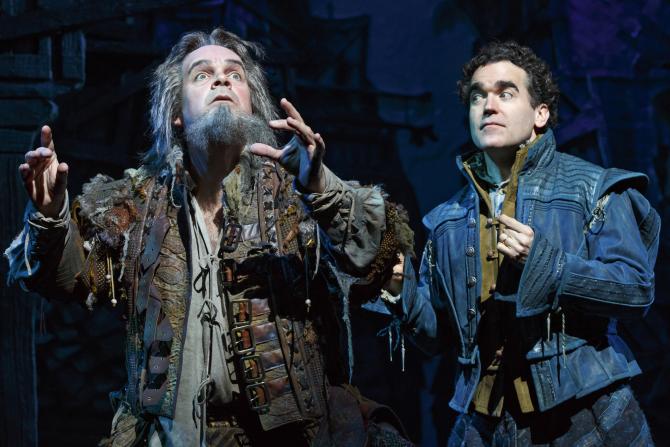
Some theater-loving friends resisted buying tickets for this show because they didn’t want to see Shakespeare ridiculed. Never fear. The thrust of Something Rotten! is a celebration of the American musical, not a tearing down of the Bard.
The show posits that two brothers, Nick and Nigel Bottom, broke away from Shakespeare’s company during the Renaissance and came up with the idea of adding song and dance to create a new genre. Experienced theatergoers know that Shakespeare already included some singing and dancing in his productions, especially in his comedies (and even in The Merchant of Venice). But we shouldn’t take this play literally. The spirit of Something Rotten! is entirely good-natured.
In fact, the song “God, I Hate Shakespeare” makes clear that Nick Bottom appreciates the writing but envies the fame of the Bard and would love to emulate him: “I guess I hate the fact that he is everything I dreamed that I could be,” Brian d’arcy Arcy James snarls as Nick Bottom: “I just don’t get it, how a mediocre little actor from a measly little town is suddenly the brightest jewel in England’s royal crown.” Bottom even is irritated by “the way he wears that silly frilly collar round his throat.” Songs and production numbers spoof the conventions of American musicals rather than dissing anything about Shakespeare’ works. Shakespeare is a cocky character who basks in his own fame but, as deliciously played by Christian Borle, you can’t hate him. We root, of course, for the resourceful Nick Bottom who inventively creates a new art form. At the end, the Bottoms have to flee England, so they take their creation to — where else? — America.
“A Musical,” led by Brad Oscar, is the big production number, spoofing the gimmicks of a dozen famous Broadway shows. Other good songs are “Welcome to the Renaissance”where everything is new: “Our mugs are made of pewter/Our houses all are Tudor” and “It’s Hard to Be the Bard” —- “You remember that, damn it, your play’s gotta be in iambic.”
I’m impressed that songwriting brothers based, respectively, in Hollywood and Nashville, were so able to capture the essence of Broadway.